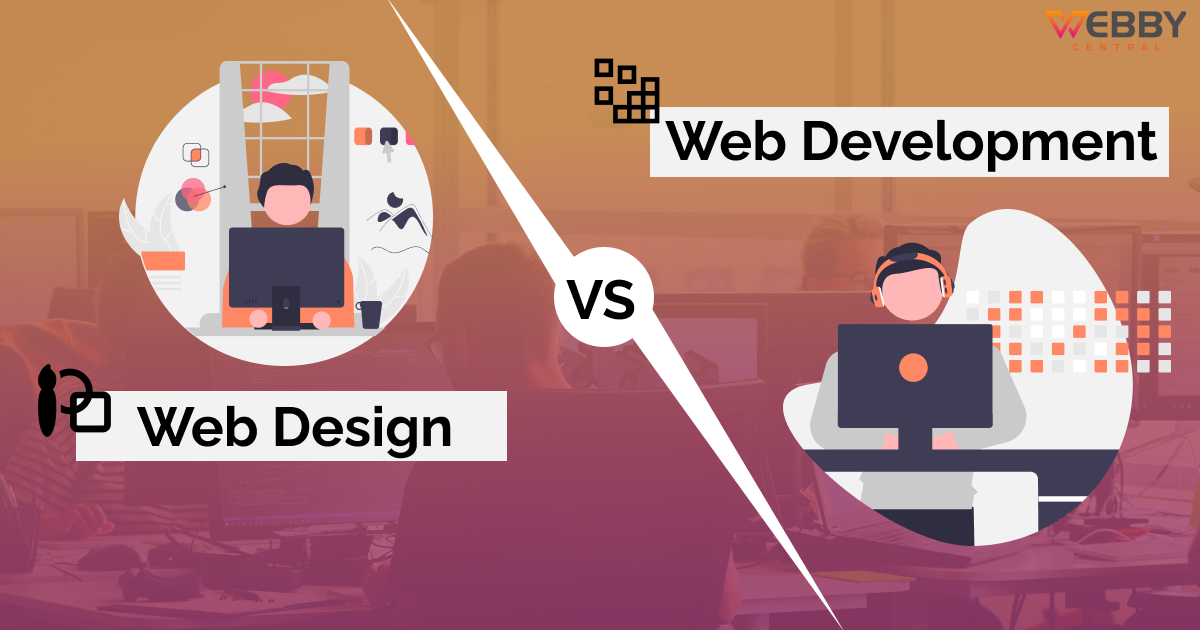If you’re confused between choosing React vs Angular for your next project, you have reached the right post. This blog compares Angular vs React over performance, popularity, scalability, price, and more to help you find out which one suits your needs better.
Technology is booming at an unprecedented pace, and so does website development. In today’s ever-evolving and competitive world, it has become pivotal for businesses to have an attractive and robust website that can look and function just the best.
To make that happen, businesses hire an experienced, skilled, reputable, and professional web development company that can take their website development game to a whole new level.
Having said that, front-end development plays a vital role in making the overall website look flawless. And there are so many options when it comes to choosing the right JavaScript front-end frameworks for your project. And that’s why it sometimes becomes confusing.
With that being said, React vs Angular are two leading names in the market. The good news? Both are top-notch frameworks. The bad news? You can select only one between these two. So how to pick the best front-end framework between Angular vs React?
The best way is to compare both the frameworks for the same factors and figure out.
What say? Sounds good? All right then, let’s compare these two frameworks in terms of various factors, but before that, let’s learn the basics of Angular and React.
React vs Angular: A Brief Overview
React
Being a popular, open-source JavaScript library developed by Facebook, React allows you to build attractive user interfaces and UI components seamlessly. The best thing about React is, it uses server-side rendering to offer a flexible, performance-oriented solution. Its component-based and declarative features let a web design company create interactive UIs easily. It works on the “learn once, write anywhere” concept.
Angular
Angular is a structural, fully-featured, JavaSCript-based front-end framework used for developing intuitive websites. It enables developers to use HTML syntax to express a website’s components precisely, concisely, and effectively. Angular has a collection of well-integrated libraries and features that can scale projects from small to enterprise levels. Plus, it’s constantly updating as the developments are led by the Angular team at Google.
React vs Angular: 7 Essential Comparison Factors to Look for
Purpose
On one hand, React is a JavaScript library that only cares about the view on MVC architecture, and requires Flux to implement this architecture. However, it also gives you more freedom when it comes to organizing the code. You can organize the code the way you want.
On the other hand, Angular is a full-fledged framework that provides a strong opinion on how your website should be structured. That said, it has many built-in small libraries that help businesses in building complex websites seamlessly.
Language
React prefers JavaScript XML; however, Angular favors TypeScript. Although, React can also be written in TypeScript, not included natively. On the other hand, as Angular favors TypeScript, it’s a superset of JavaScript and statically typed language.
In TypeScript, you can easily spot types, and code is also easier to navigate. That said, to compile the JSX code in a browser, React can be augmented with a code translation tool.
Performance and DOM
While React is excellent in boosting performance, Angular is not getting left behind in the competition. Netflix, for example, uses React for low-performance devices. Comparatively, Angular lags in the performance.
The virtual DOM trees in React don’t overload the browsers and ensure faster performance. On the other hand, the “Real” DOM and the data binding process slow down Angular’s performance when it comes to dealing with a ton of data requests.
UI Components
Angular is a structural framework used for developing dynamic websites. However, React is a JavaScript library that enables the building of attractive UI components.
React has a material-UI library and dependencies backed with a UI tool developed by the community that offers a huge variety of UI components.
Angular has integrated material design components providing various material design components, enabling easy UI configuration.
Popularity
Both Angular vs React have gained tremendous popularity over years. Along with that, they both have also gained immense popularity over the discussion forums and among the developer’s community.
However, when it comes to talking about the most popular platform between these two, React wins the battle. But that’s understood because React came way too earlier than Angular. The bigger and active a community is, the quicker it gets to find a solution for any problem that comes your way.
Scalability
When you choose a tool, it’s crucial to keep the future scope of the project in mind. Having said that, both React vs Angular heavily rely on third-party tools to handle operations.
However, you can easily develop a maintainable architecture with server-side rendering with React. On the other hand, Angular is a feature-packed framework and has all the core features developers may need for scaling an existing app by adding new functionality.
Testing and Debugging
Talking about testing and debugging, both platforms operate differently. It requires a set of tools to perform different types of testing in React. However, with Angular, testing and debugging for a complete project is possible with a single tool only.
Angular is designed in a pattern that has in-built testing requirements such as dependency injection and mocking the objects. However, React can also do something similar to some extent but with the help of specific functions.
Pros of React
- Popular
- Top-Notch Performance
- SEO-Friendly
- Greater UI/UX
- Faster Time-To-Market
- Cost-Effective
- One-Way Data Binding Feature
Cons of React
- High Pace of Development
- Incompleteness
Pros of Angular
- Better Performance
- Cleaner Code
- Better Error Handling
- Material Design-Like Interface
- Seamless Updates
- Custom Directives
Cons of Angular
- Limited SEO features
- Performance Issue
React vs Angular: Final Thought
So which is better between React vs Angular? Actually, both. Angular and React are great JavaSCript-based front-end framework options to build an intuitive website in no time. However, both offer different traits. At some point, React may sound better than Angular or vice versa. But the thing is, you need to pick the one that goes perfectly well with your business goals and budget.
Whatever you choose, make sure you consider everything from functionality to usability and more, and then make your pick wisely. Good luck!










Write A Review